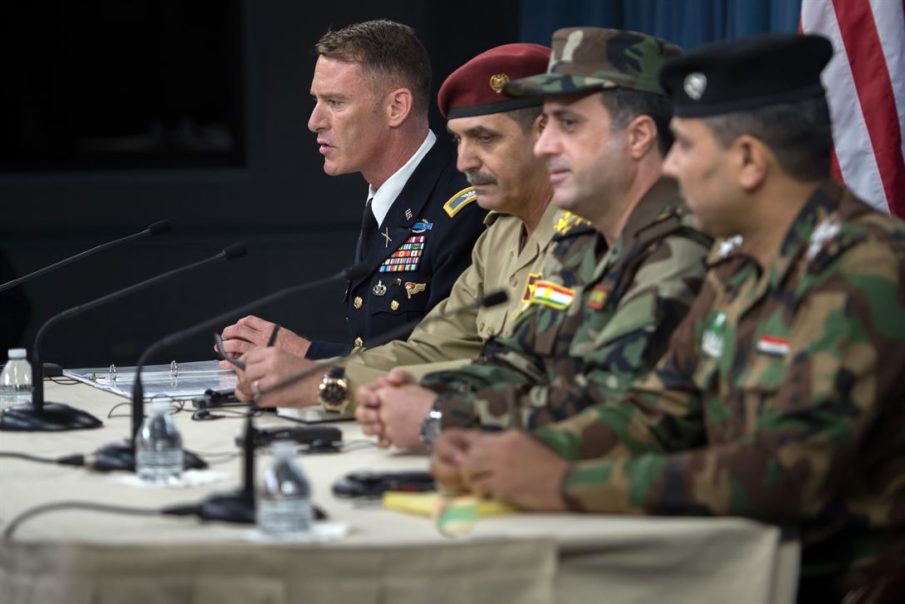U.S. and Iraqi Defense Officials held a press conference at the Pentagon on Thursday, where they discussed what the liberation of Mosul means for the ongoing war effort against the Islamic State and related extremists.
The press conference saw participation from Iraqi Brig. Gen Yahya Rasool, spokesman for the Joint Operations Command; Brig. Gen. Halgurd Hikmat Ali, the spokesman for the Kurdistan Regional Government’s Ministry of the Peshmerga; and Brig. Gen Saad Maad, spokesman for the Baghdad Operations Command and Iraq’s Interior Ministry.
Army Col. Ryan Dillon, the spokesman for Combined Joint Task Force Operation Inherent Resolve, explained to reporters that the recapture of Mosul dealt the terrorist organization a “significant blow,” but warned that there are still serious challenges ahead in the fight against ISIS. Dillon also emphasized the “Iraqi determination” that he said has placed ISIS on the rapid decline.
“Iraqi security forces, on the other hand, have only improved and gotten stronger,” the colonel said. “They have proven with their battlefield successes that they know … they are a better fighting force and they are better than the terrorists that they fight.”
Although it could be argued that Iraqi Security Forces would have faced an impossible challenge in the fight against ISIS without coalition, and specifically U.S. support, the colonel made a clear effort to give the Iraqis the credit for the victory.
And just look at how the Iraqi security forces have fought. All elements of the Iraqi security forces achieved this victory together: [the] Iraqi army, the federal police, Peshmerga forces, local police, counterterrorism service, and popular and tribal mobilization forces,” Dillon said.
According to coalition reports, Iraqi Security Forces (ISF) have cleared more than 30,000 square miles of previously held ISIS territory. Over 2 million residents that were forced to flee from their homes have since been able to return. Despite these successes, however, pockets of ISIS remain in Mosul, and certainly throughout Iraq, and the colonel was quick to point out the need to maintain pressure on the remaining fighters.
“[The] defeat of ISIS in Mosul does not mark the end of this evil ideology and global threat,” Dillon said. “With the coalition’s help, the ISF will keep the pressure on this enemy while they are on their heels and not give them a chance to rest.”
Iraqi Brig. Gen Yahya Rasoo, the joint command spokesman, also provided a prepared statement, in which he emphasized the importance of protecting civilian lives through the effort against ISIS.
Therefore, we consider this a human victory before a victory of a location, of a land,” the general said through a translator. “We liberated millions of people. We liberated them from terrorism, starvation and the worst terrorist organization in the world known to humankind. And we did a great job by this victory.”
He went on to credit the Iraqi military, counterterrorism services and the federal police forces as Iraq’s heroes before adding, “the Peshmerga — these are other heroes, and also the Popular Mobilization forces. From the beginning, they were part of all of our military operations to liberate the city of Mosul.”
Already have an account? Sign In
Two ways to continue to read this article.
Subscribe
$1.99
every 4 weeks
- Unlimited access to all articles
- Support independent journalism
- Ad-free reading experience
Subscribe Now
Recurring Monthly. Cancel Anytime.


COMMENTS